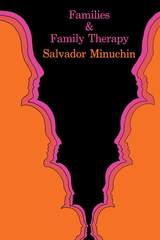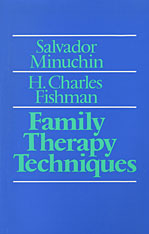
No other book in the field so fully combines vivid clinical examples, specific details of technique, and mature perspectives on both effectively functioning families and those seeking therapy. The views and strategies of a master clinician are presented here in such clear and precise form that readers can proceed directly from the book with comparisons and modifications to suit their own styles and working situations.
Salvador Minuchin presents six chapter-length transcripts of actual family sessions—two devoted to ordinary families who are meeting their problems with relative success; four concerned with families seeking help. Accompanying each transcript is the author’s running interpretation of what is taking place, laying particular stress on the therapist’s tactics and maneuvers.
These lively sessions are interpreted in a brilliant theoretical analysis of why families develop problems and what it takes to set them right. The author constructs a model of an effectively functioning family and defines the boundaries around its different subsystems, whether parental, spouse, or sibling. He discusses ways in which families adapt to stress from within and without, as they seek to survive and grow.
Dr. Minuchin describes methods of diagnosing or “mapping” problems of the troubled family and determining appropriate therapeutic goals and strategies. Different situations, such as the extended family, the family with a parental child, and the family in transition through death or divorce, are examined. Finally, the author explores the dynamics of change, examining the variety of restructuring operations that can be employed to challenge a family and to change its basic patterns.



Salvador Minuchin is widely recognized as one of the preeminent family therapists in the world. He has been described, in the American Journal of Psychotherapy, as “a most original innovator, a superb clinician, and an outstanding teacher.” Now, in this pioneering work, he and his co-authors apply the effectiveness of family therapy techniques to an illness that has long resisted treatment—anorexia nervosa.
The purpose of their book is threefold: to develop a new theory of psychosomatic disease, to confirm it with scientific data, and to show it unfolding in actual therapeutic situations with anorectic patients. Drawing upon their own clinical experience and illustrating their views with case studies, they advance a new approach that places the locus of the illness not in the individual but in the family. Their method, which has been highly successful, requires the active involvement of the therapist as an agent of change within the family, stimulating crises that are severe enough to shake up the system and allow it to reform in new and healthier patterns.
This book has revolutionary implications, not just for anorectic patients but for those suffering from all other psychosomatic disease. Whereas such illnesses to date have often eluded treatment, the approach through family therapy holds out the promise of future successes.
READERS
Browse our collection.
PUBLISHERS
See BiblioVault's publisher services.
STUDENT SERVICES
Files for college accessibility offices.
UChicago Accessibility Resources
home | accessibility | search | about | contact us
BiblioVault ® 2001 - 2024
The University of Chicago Press









